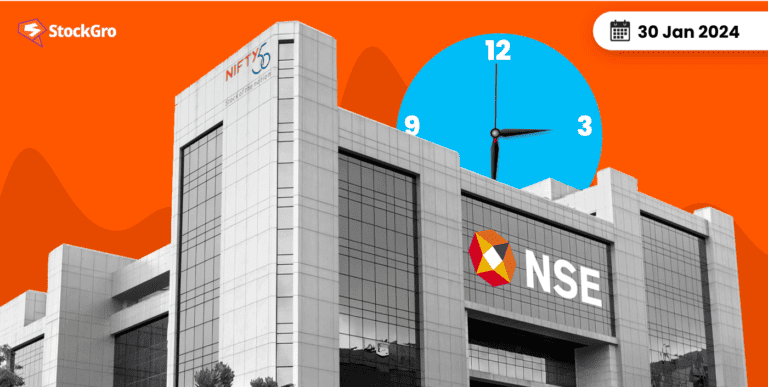Table of contents
The most happening world of the stock market is where prospects for profitable investments flourish, and big wins are possible. It would help to familiarise yourself as an investor with the several channels to enhance wealth. In this regard, FDI or Foreign Direct Investment acts as the most suitable channel through which exploring the share market becomes more convenient. FDI can help access international capital while participating in the success of companies in a nation different from yours.
Read on till the end to find out what FDI is, how it works, the types of FDI in India, and the benefits of embarking on a smooth investment.
What do you mean by FDI or foreign direct investment?
Foreign direct investment is the purchase of a certain organisation’s interest by another foreign organisation. That investor or organisation is located in a country different from the stake-holding company. It means buying a large share of a foreign company in commercial terms. Several companies find it extremely beneficial and convenient to expand their business.
FDI entails taking up ownership positions or exerting substantial control over the foreign company. Gaining long-term market participation, making money, breaking into new markets, and transferring knowledge and technology are the goals of foreign direct investment (FDI).
Make sure to avoid getting confused between FDI and FII. The main difference between FDI and FII is that the former refers to the investments made by companies in foreign entities. On the contrary, the latter deals with institutional investors who invest in the country’s financial market.
Working of FDI
Companies seeking foreign direct investment (FDI) will only choose companies with highly skilled and productive workforces. Organisations typically search for these companies in nations with free markets. This is because investor growth possibilities are above average in such open marketplaces. Tax laws are crucial when choosing a foreign location for foreign direct investment. Naturally, areas with less tax regulations are favoured.
Compared to capital investment, the scope of foreign direct investment is greater and larger. It consists of the following items:
- Provision of technology
- Provision of management
- Establishment of a substantial level of control over foreign business
- Provision of equipment
- Ability to impact the decision-making of foreign business
Types of FDI
The primary types of FDI in India are as follows:
Horizontal
The first category is evident when a business expands and ventures into a foreign country through Foreign Direct Investment (FDI) without altering its core operations.
Vertical
In this scenario, a business enters a foreign economy to enhance a segment of its supply chain without altering its core operations.
Conglomerate
The third category is when a business invests in a foreign country and acquires an entity producing entirely different products. To clarify, it aims to diversify business niches and embark on new ventures in other countries.
Platform
The final category pertains to a business expanding to a foreign country, where all manufactured goods are exported to a third country. Platform Foreign Direct Investment (FDI) is commonly observed in countries actively seeking FDI opportunities in the free-trade zones.
What are the factors affecting FDI in India?
Many factors can influence foreign direct investment. Some of the major FDI factors are:
- Market Size: Foreign direct investment often seeks countries with large and growing markets. Businesses want to promote their products or services to the greatest possible market.
- Economic Growth: Countries with robust economic growth attract FDI. Most companies prefer to invest in areas where their products or services are necessary and the economy is likely to grow.
- Political Stability: Foreign direct investment gains more attention by political stability. Businesses want to invest in countries with a small chance of political upheaval or violence.
- Tax Rates: Foreign direct investment is also affected by tax rates. The reason companies prefer to invest in low-tax countries is obvious.
- Infrastructure: A country’s infrastructure also affects FDI. Companies tend to invest only in countries with high transportation, communication, and energy development.
- Labour Costs: Foreign direct investment might also be affected by labour expenses. There is increased investment willingness in low-wage countries.
- Intellectual Property Rights: FDI might be affected by protecting intellectual property rights. Because companies are unwilling to invest in nations where their intellectual property will be stolen or violated, countries safeguard investors’ rights.
Pros of FDI
Following are some effects of FDI in India that prove to be beneficial for the nation:
- Increased employment and economic growth
Creating jobs is the most obvious benefit of FDI. It is one of the most important reasons a country, especially a developing country, seeks FDI. More FDI benefits the industrial as well as service sectors. This, in turn, creates jobs and helps reduce the number of unemployed among the country’s educated young, skilled, and unskilled workers. More employment means higher earnings and, thus, greater purchasing power for the populace. This helps the country’s economy.
- Human resource development
This is one of the most subtle effects of FDI in India. For this reason, it goes overlooked. The knowledge and skills of the workforce are human capital. Skills obtained and strengthened via training and experience improve the country’s education and human capital quotient. Human capital is movable after its development. It can train human resources in other organisations, causing a chain reaction.
- Development of backward areas
This is one of the biggest advantages of FDI for a developing country. Foreign direct investment enables the backward areas of a country to turn into industrial centres. This, in turn, strengthens the local social economy.
- Provision of finance & technology
Recipient companies can access the most recent finance tools, technology, and operating methods worldwide. The introduction of newer, improved technologies and processes results in their diffusion throughout the local economy, resulting in increased industrial efficiency and effectiveness.
- Increase in exports
Not all FDI-produced commodities are for domestic consumption. The selling of many of these goods might occur on a global scale. Establishing 100% export-oriented units and economic zones has also aided FDI investors in increasing their exports to other nations.
- Exchange rate stability
A consistent flow of FDI into a country means a constant flow of foreign exchange. These effects of FDI in India assist the country’s Central Bank in maintaining a comfortable foreign exchange reserve. As a result, exchange rates remain constant.
- Creation of a competitive market
Foreign direct investment promotes competition, breaking domestic monopolies by allowing foreign firms into the marketplace. A competitive environment encourages improvement in business processes and products, fostering innovation through FDI in retail. Also, consumers get access to a wider variety of cheap goods.
Disadvantages of Foreign Direct Investment
The disadvantages of FDI are as follows:
- Hindrance of domestic investment
FDI can occasionally inhibit domestic investment. Local businesses in those nations lose interest in investing in their goods due to FDI.
- The risk from political changes
The political landscape of other nations is subject to frequent change, which might be detrimental to investment.
- Negative exchange rates
Foreign direct investments can occasionally impact exchange rates to benefit one nation while harming another.
- Higher costs
Investors may discover that FDI in retail or foreign country investments is more costly than exporting commodities. Frequently, the cost of equipment and intellectual property is more than that of local workers’ salaries.
Final note
In summary, Foreign Direct Investment (FDI)is increasing in India. Aviation also become a part of the list of industries open to 100 % FDI by the Indian government taking major steps for liberalisation. Therefore, India has become an attractive investment destination. It offers a large market and well-trained labour with friendly business climate conditions. The greatest benefit from foreign direct investment will be for consumers who can enjoy the arrival of more multinational businesses.
FAQs
FDI or Foreign Direct Investment is the type of investment made by a person or company from one country in business interests located in another country. This involves acquiring a lasting interest and significant influence in foreign business.
Yes, like any investment, FDI also involves some type of risk. These may include political instability, regulatory changes, and economic uncertainties in the host country. So, companies need to assess these risks before making FDI decisions.
To attract FDI, a country can implement policies that provide a stable and transparent business environment, offer incentives, improve infrastructure, and streamline regulatory processes to make it easier for foreign investors to operate.
Yes, FDI has the potential to reduce poverty in host countries by generating employment opportunities, fostering economic growth, and improving living standards through increased income and access to resources.

